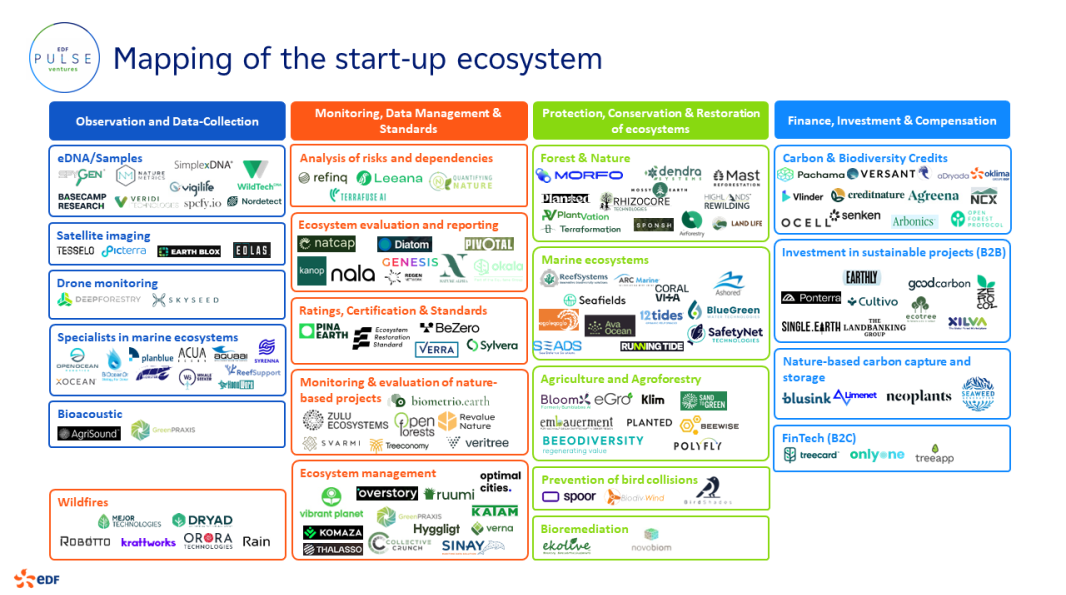For the past 50 years, EDF has been committed to ecosystem protection. In support of the Group's actions, EDF Pulse Ventures has conducted a thorough study on the subject and is showcasing 3 startups from its portfolio that are working to benefit biodiversity.
Threatened biodiversity: a necessary mobilisation
Biodiversity provides essential resources for human life: food, water, medicine, climate stability, and more. Unfortunately, this natural capital has been deteriorating at an alarming rate in recent decades. Over 70% of ice-free terrestrial surfaces have been profoundly altered by human activities, leading to the destruction of habitats for animal and plant species. As a result, we are facing a major biodiversity crisis today, with one million species threatened with extinction.
Moreover, climate change exacerbates biodiversity disruption: 4% of mammals will lose half their habitat with a temperature rise of +1 °C, 8% with +2 °C, and more than 41% if temperatures increase by +3 °C. The situation is even more critical for coral reefs, 99% of which are doomed to disappear irreversibly if warming reaches 2°C. The intensification of wildfires, a direct consequence of climate change, has devastating effects on forests and biodiversity overall.
This collapse is not without consequences for the global economy. According to a PWC study, 55% of global GDP, or $53 trillion, depends on nature. Furthermore, the collapse of ecosystems, driven by factors such as air and water pollution and biodiversity loss, could result in a loss of $2.7 billion per year. In light of these critical findings, businesses find themselves at a decisive turning point where preserving biodiversity is no longer an option but an economic and societal necessity.
Companies must not only comply with a complex regulatory framework regarding biodiversity protection but also anticipate its evolution to avoid risks of financial and legal penalties. Non-compliance can lead to severe consequences, both criminally and in terms of image and reputation. Indeed, beyond mere compliance, consumers and employees now demand that companies become true agents of environmental change. This profound shift in mindset compels organisations to rethink their business models to integrate biodiversity preservation as a cornerstone of their sustainable development strategy.
EDF's commitment to biodiversity
EDF is dedicated to protecting biodiversity through a comprehensive strategy that includes avoiding and minimizing its impact, preserving and restoring natural environments, advancing knowledge, and transforming internal processes. These commitments are publicly available on the act4nature international website.
-

Minimising impacts on biodiversity
EDF aims to reduce its contribution to the five key factors affecting biodiversity. To achieve this, management plans have been developed for all of its production sites1 (thermal, nuclear, and photovoltaic2) in France3 and Belgium. The Group is also focused on decreasing resource consumption throughout its supply chain.
-

Preserving and restoring ecosystems
EDF fosters knowledge and coexistence while promoting the development of at-risk species on its land, utilizing locally sourced plants for ten restoration projects. Additionally, the Group collaborates with local partners to preserve and restore natural environments at twelve sites by 2025.
-

Advancing knowledge
EDF continues its research efforts to minimize the impact of production facilities on biodiversity, investing over €6 million annually in R&D projects, and integrating environmental criteria into 70% of its procurement processes.
-

Transforming processes and skills
In partnership with the IUCN, EDF is contributing to the creation of new biodiversity guidelines for wind and solar energy. The Group is also educating over 5,000 employees to enhance the culture of sustainability and is supporting its customers in reducing energy consumption.
Start-ups in the biodiversity ecosystem
Investments in technologies related to the preservation or restoration of nature reached $2 billion in 2022, particularly in the fields of environmental monitoring and reforestation, recording a compound annual growth rate (CAGR) of 44.2% from 2013 to 2023. However, a significant challenge remains: while current funding for biodiversity only amounts to $78-91 billion per year, experts estimate that $830 billion annually is needed to reverse the trend of biodiversity loss.
To build its investment thesis and support the EDF Group in its biodiversity commitments, EDF Pulse Ventures has identified around one hundred players positioned throughout the value chain of biodiversity protection and nature. This value chain is divided into four main segments:
- Observation and Data-Collection: The primary challenge is to gather quality data that enables companies to make informed decisions. One of the major difficulties in the sector is the complexity of rigorously measuring biodiversity and the diversity of data types required.
- Monitoring, Data Management & Standards: This category includes solutions that allow for tracking and demonstrating the impacts of corporate activities and restoration or compensation projects, and ensuring regulatory compliance.
- Protection, Conservation, & Restoration of Ecosystems: Companies' biodiversity commitments lead to the development of projects in various environments and ecosystems (forests, oceans, agricultural lands, etc.).
- Finance, Investment, & Compensation: The challenge is to identify sustainable funding sources for these projects and new compensation models.
The mapping below (not exhaustive) summarises the inventory conducted as part of this analysis.

3 Start-ups from the EDF Pulse Ventures portfolio positioned on this value chain
- NatureMetrics in the "Observation and Data-Collection" Segment
NatureMetrics is a start-up specialising in biodiversity measurement and monitoring, pioneering in the field of environmental DNA (eDNA). This revolutionary technology allows for the measurement and monitoring of ecosystems while detecting specific species by analysing traces of DNA left by organisms in water, soil, and air to identify species present in a given area. The eDNA method enables detailed inventorying in a non-intrusive manner, measuring ecosystem evolution, and detecting the presence of threatened species or the arrival of invasive exotic species.
On its platform, NatureMetrics also offers complementary data to eDNA, such as satellite imagery monitoring, providing a comprehensive solution for ecosystem measurement and monitoring.
The partnership with NatureMetrics brings two major strategic advantages to EDF: firstly, access to cutting-edge expertise in environmental DNA, enabling the Group to optimise its regulatory environmental declarations; and secondly, strengthening its position as a key player in biodiversity protection.
- BeZero in the "Monitoring, Data Management & Standards" Segment
BeZero is a rating agency specialising in the evaluation and rating of carbon credits on a global scale. Its fundamental mission is to bring transparency and credibility to the carbon offset market. By developing a rigorous assessment methodology, BeZero allows companies and investors to understand the actual quality and potential impact of carbon offset projects through strict scientific and environmental criteria. BeZero also provides risk management tools associated with carbon credits, including ex ante evaluation of credits.
Beyond its expertise in carbon, BeZero is also active in biodiversity matters. Its assessments do not focus solely on reducing CO2 emissions but also consider the overall impact of projects on local and global ecosystems. This holistic approach ensures that offset projects not only reduce emissions but also contribute to the protection of natural habitats, the maintenance of species diversity, and the sustainable development of local communities living in these fragile environments.
With BeZero's expertise, EDF actively contributes to the development of transparent carbon offset markets while enhancing its ability to effectively assess high-impact environmental offset projects.
- Oklima in the "Finance, Investment & Compensation" Segment
Oklima is a subsidiary of the EDF Group specialising in carbon contribution. It develops forestry and agricultural projects that contribute to carbon sequestration, such as multi-species afforestation projects. These projects are certified in France by the “Low Carbon Label.” Oklima offers its clients the opportunity to finance these projects as part of their greenhouse gas emission reduction efforts.
Utilising carbon contribution is indeed one of the pillars in the fight against climate change, following the "Measure-Avoid-Reduce-Compensate" logic. Within this global framework, the EDF Group supports its clients in their decarbonisation strategy by offering a full range of services, starting with measuring their carbon footprint and defining a decarbonisation roadmap, with its subsidiary Urbanomy. Oklima thus complements this portfolio of offerings by providing high-quality carbon contribution services to help the EDF Group and its clients—businesses and communities—contribute to their residual emissions.
1A management plan defines the zoning on the sites with management measures adapted to the sake and with a land vocation (industrial activity…). The objective is to reconcile biodiversity and electricity production. 2Respect to the PV fleets, they are PV fleets at stake, which present biodiversity stakes (determined in the impact study for the assessment of the initial condition and the application of the ERC sequence) and requiring the implementation of adapted measures, without distinction of their ‘’degraded’’ character or not. 3Respect to the Overseas Departments they are sites having revealed the presence of invasive exotic species.
